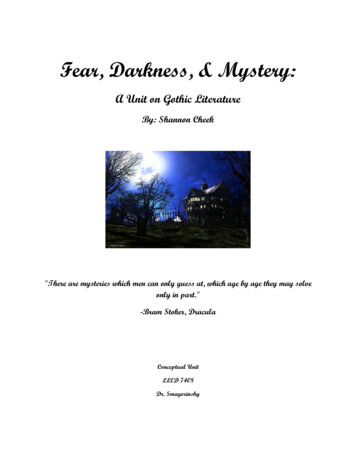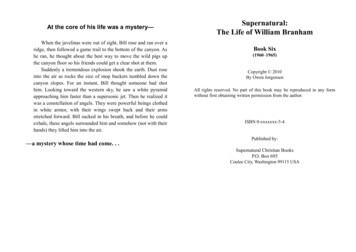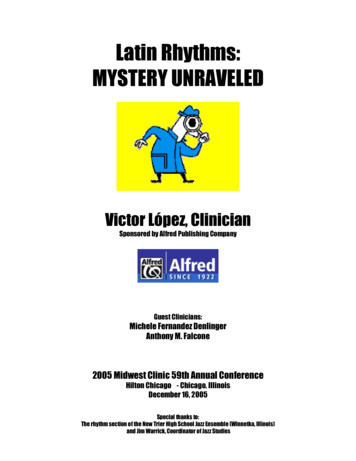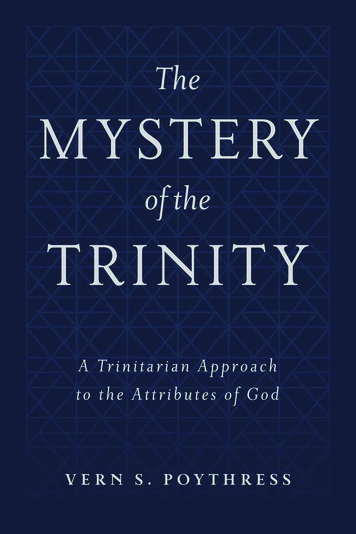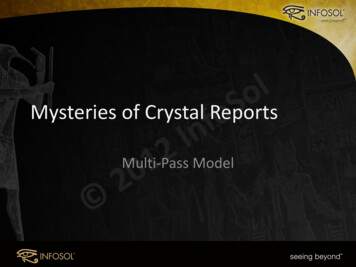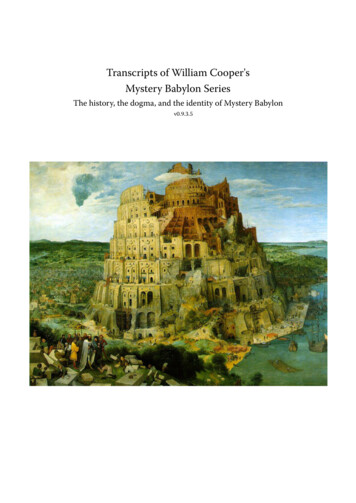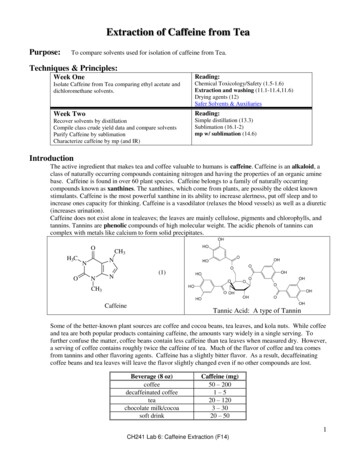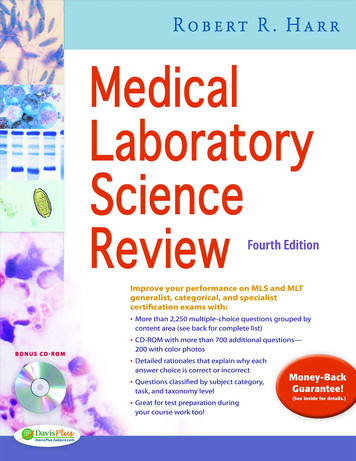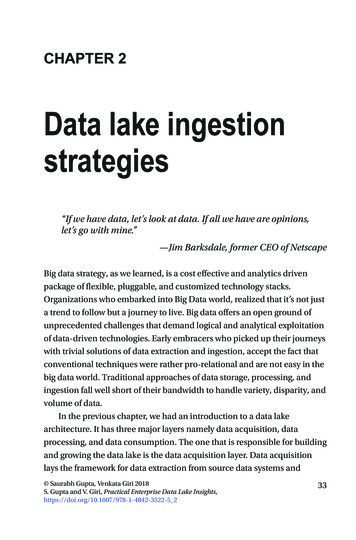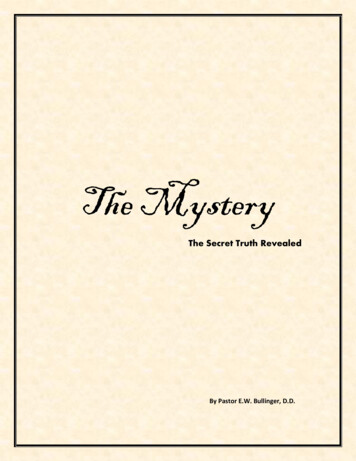
Transcription
The MysteryThe Secret Truth RevealedBy Pastor E.W. Bullinger, D.D.
Table of ContentsIntroduction by Joel Hayes1) The Meaning of the Word Mystery2) The Secret of the Interval3) The Body of Christ4) Other Passages Relating to the Secret5) Practical Conclusions6) The Body and the BrideAbout the AuthorBullinger’s Death NoticeAbout The Mystery: The Secret Truth RevealedURL: inger/uqw1nAuthor: Bullinger, E.W. (1837-1913)Publisher: Joel HayesPrint Basis: Things To Come (1895-1896)Rights: Public DomainDate Created: 2016-03-28
Contents NextIntroductionThe Apostle Paul spoke often about a mystery in the Bible. In Colossians 1:26-27, he wroteabout “the riches of the glory of this mystery,” and how this “mystery” was “hid from ages andfrom generations, but now is made manifest to his saints.” In Romans 16:25, he talked about“the revelation of the mystery, which was kept secret since the world began.” In Ephesians 1:9,he called it “the mystery of his will.” In Ephesians 3:3, he said the Lord “made known unto methe mystery.” In Ephesians 3:7-9, he explained that he was made a minister “to make all mensee what is the fellowship of the mystery, which from the beginning of the world hath been hidin God, who created all things by Jesus Christ.”Paul suffered deeply for talking about this mystery. In Colossians 4:3, he wrote, “Withal prayingalso for us, that God would open unto us a door of utterance, to speak the mystery of Christ, forwhich I am also in bonds.” It’s “a great mystery,” he wrote in Ephesians 5:32.Do you know what this mystery is and have you solved it yet?Well, if you haven’t solved this puzzle then you’re in for a real treat. E.W. Bullinger so clearlydefines “the mystery” of which Paul wrote so often and also emphasizes the significance of thismystery to us today. This truly is the key to understanding the Scriptures and helping us to seeour place as members of the Body of Christ within the big picture of God’s eternal purpose toglorify His Son, who was made to be sin for us and who died for us so that we may live “in Him.”Do you know if you are saved and going to Heaven? We pray that you do.Fractured versions of this book, which was at first a series of articles printed in his Things toCome newsletter, have been posted online, but we took it upon ourselves to make a fullunedited version available for free so that word may get out about the Mystery and hopefullysaints may be edified and God glorified as they come to recognize key distinctions in theScriptures between prophecy and mystery, Israel and the Church, as well as the Bride of Christand the Body of Christ, which Bullinger sometimes refers to as “Christ Mystical.”So many paragraphs in this book just take your breath away, but I particularly loved whatBullinger wrote at the end of chapter 4:“Have we not here a practical subject for our own hearts? What is our condition before God?Are we taken up with ‘bodies’ and divisions which men have made, and called by their ownnames, or the names which man has given them? If so, we too are not, spiritually, in a propercondition to hear or receive “the mystery of God.” No wonder the blessed truth so earlydropped out of the creed of the Church of God! No wonder, when, in our day, it has beenrevived, so few care to know it. No wonder that many resent its revival; for it judges out
Ecclesiastical position to the very core. It makes nothing of the sects and denominations forwhich the majority are contending; it writes folly upon our most cherished idols. No wonderChristians are torn and divided and scattered, when they ‘discern the Body’ (1 Corinthians11:29). No wonder the air is filled with false schemes for re-uniting the scattered sects whensuch gross darkness prevails as to what is, subjectively, ‘the unity’ of the Spirit, and objectively,the union of the members with one Head of the Body in the glory which is about to be revealed.“Oh, to get back to this primitive truth! Here, and here alone, is the secret of the Re-union; forthough scattered among the sects, and regarded by men as totally separated, the members ofthis Body are already and really ‘one in Christ.’ This is the only real union that exists in theworld, and the more truly believers can now realize their position as ‘dead with Christ,’ ‘risenwith Christ,’ and thus ‘one with Christ,’ and ‘in Christ,’ the more real unity will there be amongthe members themselves, one with another.”To get back to this amazing truth and to stand for this truth is my prayer for every reader.-Joel Hayes, FBC LibrarianBack Contents NextI. THE MEANING OF THE WORD MYSTERY.There is no subject of greater importance to the Church of God than that which, in the NewTestament, is called “The Mystery”: but it is not every Christian who is in a position to receive it.Only those who have believed God, and who have thus been justified as Abraham was by faithin His Word concerning the redeeming blood; and who, in “the obedience of faith,” reckonthemselves to be dead and risen again in Him, and whose citizenship is now in heaven – onlythese are the fit recipients of the wondrous revelation of the “Mystery of God and of Christ.”God’s Gospel concerning His Son Jesus Christ had been promised through the Prophets in theHoly Scriptures, as we read in Romans 1:1-3; but the Mystery of the Body of Christ had neverbeen revealed, and did not therefore form the subject of Old Testament Prophecy. It was thesubject of a special revelation to Apostles, and Prophets, and Saints through St. Paul, to whomand by whom this Mystery was first announced in mortal ears and it was communicated only tothe Saints who had been redeemed by the precious blood of Christ, who had been justified byfaith, and sealed with the Holy Spirit of promise; only to those whom God, who is rich in mercy,was pleased to make known that which has hitherto been hidden in Himself, and was neverpreviously revealed unto the sons of men.When Christians left their first love in the earliest days of the history of Christendom, thisprecious revelation was apparently the first which became obscured and lost sight of. Then thetrue teaching concerning the Holy Spirit in the Church became less and less clear, especially
while the simple foundation of the truth of justification on the principle of faith alone was alsobeing departed from. These precious truths – by the Lord’s long-suffering patience and mercy,have been partially recovered in these last days out of the wonderful treasury of His Word, butnever, perhaps, in their pristine freshness and clearness.It is our object now, in dependence on the Lord’s goodness, and reliance on the Holy Spirit’sguidance, to do something to recover the blessed truth concerning the “Mystery,” and thusendeavour to be a “good scribe,” bringing out of the Master’s treasures something that is oldbut yet new, and new but yet old.It will be well at the outset to define our terms, and to have a clear understanding as to themeaning of the word. The word “Mystery” is not an English word at all; it is a Greek word,transliterated. True it has become Anglicized, and is in common use to-day, but its meaning haschanged, and is very different from the meaning which the Greek word originally had, and stillhas of course, in the Scriptures. We use it of something which no one can understand. This isnot altogether wrong if we add the thought – until he is initiated!In the Greek, the word musteerion means simply “a secret.” It occurs in the Septuagint onlynine times as the equivalent of the Hebrew word ratz, which means to conceal hence, a secret.It occurs in Dan. 2: 18, 19, 27, 28, 29, 30, 47 (twice), and in 4:9, and is translated “secret.” It wasthe king’s secret which had gone from king Nebuchadnezzar, and which no one could tell him,until God revealed it to Daniel.The Apocryphal Books, while they are of no use for establishing doctrine, are of great use inshowing the meaning and usage of words. In these words the word frequently occurs, and isused of the secrets of friends, the secrets of private life, and the secrets of a king; but always ofa secret. Take a few examples:Eccl. 22:22, “If thou has opened thy mouth against they friend, fear not, for theremay be reconciliation; except for upbraiding, or pride, or disclosing of secrets, ora treacherous wound; for these things every friend will depart.”Eccllus. 27:16, “Whose discovereth secrets loseth his credit: and shall never finda friend to his mind.”Eccllus. 27:17, “Love they friend, and be faithful unto him; but if thou betrayeshis secrets follow no more after him.”Eccllus. 27:21, “As for a wound, it may be bound up; and after reviling here maybe reconcilement; but he that betrayeth secrets is without hope.”II Maccabees 13:21, “But Rhodocus, who was in the Jews’ host, disclosed thesecretes to the enemies.”
Wisdom 14:23, “They slew their children or used secrete ceremonies.”Tobit 12:7, 11, “It is good to keep close the secret of a king, but it is honorable toreveal the works of God.”Judith 2:2, “Nebuchadonosor called unto him all his officers, and communicatedwith them his secret counsel [lit. the secret of his will],” i.e., hs plan as to thecampaign on which they were about to set out.Wisdom 2:22, “As for the secrets of God, they [the wicked] knew them not.”Thus, it is perfectly clear and certain that the word Mystery, as used in the Scripture, is simply asecret. But by the end of the second century after Christ the word musteerion had acquired anadditional use. It was used not only of a secret, but of a secret sign or symbol. In this sense theGreek fathers employed it to denote any such sign, whether of words or actions. They spoke ofthe offering of Isaac as a musteerion, i.e., a sign or symbol of the secret purpose of Godconcerning His Son Jesus Christ. And they used it interchangeably with the words tupos, type;sumbolon, symbol, and parabolee, parable. It has a sense, therefore, similar to these words.Justin Martyr (A.D. 148) says that in all false religions the serpent was represented as “a greatsymbol and musteerion” (Apol. i. 27). So in his reference to the Paschal Lamb, he says, “themusteerion therefore of the Lamb was a type of Christ.” Speaking of Isaiah 7:14, “Behold avirgin shall conceive and bear a son,” he says, “since this refers to the house of David, Isaiah hasexplained how that which was spoken by God to David, in a mystery, would actually come topass. Perhaps” he adds, “you are not aware, my friends, of this – that there were many sayingswritten obscurely; or in parables; for secret signs; or in symbols, which the prophets who livedafter the persons who said or did them, expounded” (Trypho, c. 68).Other examples might be cited, but these are sufficient to show us how the word “mystery”had come to be used. It was practically synonymous with a symbol, and yet there was a slightdifference. Perhaps a secret sign would best express it; and this was the usage of the wordwhen the Revelation was given to John. Hence, in that book, we must give the word thissignification. In Revelation 1:20, it is used of “the mystery of the seven stars,” and in 17:5, 7, it isused of “Babylon.” Thus in these things we are to see a secret sign of something which theywere to represent.It is remarkable also that soon after this we find the Latin version translating the word mystery(in Ephesians 5:32) by the word sacramentum, i.e., sacrament. From this it is positive that atthat time the word sacramentum or sacrament meant merely a secret sign or symbol! It hadnot then acquired its later theological use; but the word “sacrament” had reference merely to asymbol, or a symbolical act, a secret sign, shewing forth the Lord’s death.The popular etymologies of the word are therefore all wrong and misleading. If the word(according to Tertullian) had any reference to a military oath, it was only because in the
administration of that oath some secret sign was given or made which symbolically representedit. It is certain, therefore, that the modern and ecclesiastical use of the word “sacrament” is notonly a gross misrepresentation of the truth, but it is founded on ignorance of the history of theword.1) The Greek musteerion means a secret; and later a secret sign or symbol.2) The Latin sacramentum is used in the Vulgate as the equivalent of musteerion in Eph.5:32, therefore sacramentum meant, and means, a secret sign or symbol.This gives us the true meaning of the word as used by the Reformers in one of their prayers.When they say “these holy mysteries,” they mean “the special commemoratives of bread andwine,” i.e., these signs and symbols which are used to “show forth the Lord’s death.” Thus, inour search for truth, two great errors are, at the outset, corrected: 1) The true meaning of theword Mystery in the Scriptures is not something that cannot be understood, but somethingkept secret – a secret truth or sign, revealed to those who are initiated; and 2) the theologicalword Sacrament is not some act of ecclesiastical jugglery, but a simple symbolical act, by whichthe Lord’s people show forth their Lord’s death.We are now prepared to apply the meaning of the word mystery, thus ascertained, to thevarious passages in the New Testament where it is used.Back Contents NextII. THE SECRET OF THE INTERVAL.There are several secrets which are there spoken of; and there is one that is called the “greatsecret” (Ephesians 5:32). They are all of them connected with the present interval between thefirst and second Advents of the Lord Jesus. That there was to be an interval at all between “thesufferings of Christ and the glory that should follow” I Peter 1:10-11 (cf. Luke 24:26) was notrevealed in the Old Testament. The “sufferings” themselves were not secret; neither was the“glory that should follow.” Both were subjects of Old Testament prophecy. Both are there fullyand plainly revealed. And what is very remarkable about those prophecies is this, t
28.03.2016 · Author: Bullinger, E.W. (1837-1913) Publisher: Joel Hayes Print Basis: Things To Come (1895-1896) Rights: Public Domain Date Created: 2016-03-28 . Contents Next Introduction The Apostle Paul spoke often about a mystery in the Bible. In Colossians 1:26-27, he wrote about the riches of the glory of this mystery, and how this mystery _ was hid from ages and from generations, but now is
